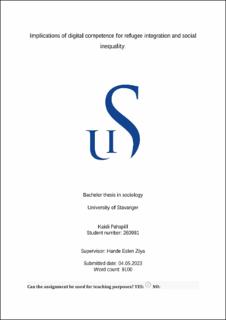| dc.description.abstract | In recent years, the integration process of newly arrived refugees has become an increasingly important concern. Digital competence has an essential role in the process of refugee integration as well as in later societal outcomes for the host society (Abujarour & Abujarour, 2020; Alencar, 2018; Bønnhoff, 2021; Potocky, 2022).
El Amrani et al. (2022) conducted a study on digital competence levels for newly arrived refugees, as a part of research conducted for IMDi to shed light on potential differences in this area in Norway. The study found that over half of the participants exhibited low levels of digital competence (El Amrani et al., 2022). The report`s lack of theoretical presentation raised my interest in investigating this matter more closely. I was curious to find a theoretical framework as well as facilitate a reflective analysis about the implementation of digital competence and the ensuing societal implications, for refugees. This concern became the research topic of this paper, looking into the implications of digital competence for refugee integration and inequality. The aim is to review recent scholarly works to gain insight into existing knowledge and identify gaps in the literature. In doing so, the aim is to critically analyse current academic literature in the Norwegian context.
The findings indicate that digital competence, having such a significant role within refugee integration and their perspectives on later societal possibilities, needs further investigation to better understand its underlying mechanisms and outcomes when holding and lacking this competence. To comprehend the gap between the importance and need of digital competence for refugees in society, a Bourdieusian perspective of digital capital, as presented by Ragnedda and Ruiu (2022) will be examined. | |
